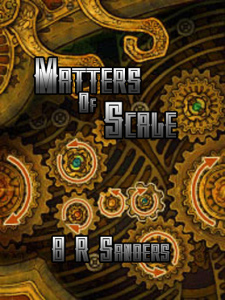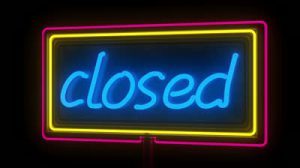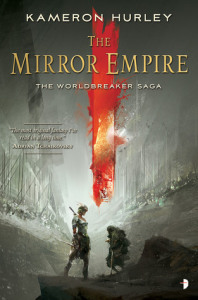B.R. Sanders's Blog, page 20
September 8, 2015
Privilege in Action: Who Gets Listened To And Who Gets Harassed
Since I posted it late Saturday night, my post about a white author’s decision to sit on a panel about Writing the Other has garnered over 5,000 views.
That’s staggering. That’s literally mind-blowing to me. My second most viewed post has, I think, 200 views, and that’s accrued over weeks. For this blog to get more than 80 hits in a single day is A Big Deal. So this…this is something else.
When I wrote that post and linked it to twitter I didn’t think it would take off like it did. And when my mentions started filling up, I braced myself for the worst. But the worst never came. I have had no death threats, no rape threats, no ‘go die in a fire’, nothing. Nothing but genuine engagement and thoughtful interaction with my post. It has been lovely.
I can’t help but think that it’s because I’m white.
I can’t help but think that if I was a woman of color that I would be drowning in rape threats and death threats right now.
I can’t help but think that this post, calling out my own privilege and articulating my comparative lack of risk when speaking out on issues of racism, is not going to get 5,000 views.
Nothing I said in that post is any different than what women of color have said in regard to these topics. But I unleashed a stream of words into the world, and they were listened to, engaged with, taken seriously. They sparked conversations instead shutting conversations down as an “angry” WOC’s word might have done.
I wonder how many people who read my post assumed I was a man, and cis, and straight, and unwittingly unconsciously gave my words more heft as a result.
Don’t get me wrong–I’m pretty fucking glad I didn’t get harassed. But I’m feel like I have an obligation to point out right now that any impact that post might have had did so from a place of privilege. I want to own that. I want to point out that this, too, is part of what we have to deconstruct if we’re serious about dismantling racism in publishing.
Dear other white people: people like me can’t be the only people you listen to about issues like this. If the only things you’re willing to read come from someone who looks like you do, then you’re doing allyship wrong.


September 7, 2015
TBR Pile is Full-Up
Hi all!
Well, that did not take very long. My TBR list is full-up through the end of December, at least, so I’m closing my Book Review Request form for a little while until I can get some breathing room. I just hate accepting authors books and telling them that I’ll get to their book….in seven or eight months.
It will re-open! If you’re interested in knowing when, I’d suggest signing up for my newsletter to get notified of when I’ll be open to requests via the form again. Otherwise you can always check what my TBR list looks like here and send me book recs on twitter or leave comments on this blog or at goodreads.
-B


Guest Post on Blog Z!
Hi friends!
I hope you’re having a lovely Labor Day! Want some Labor Day-related reading? I have just the thing: my post “5 Labor Leaders in Sci-Fi and Fantasy” is live over at Blog Z right now! Head over and take a gander!
-B


Roundup: August 31-September 6, 2015
Wanderings on the Internet
If you’re looking for more things to read about diversity in publishing, you should really check out Justina Ireland’s “This is Why We Can’t Have Nice Things” storify
Also, if you’re a writer/reader or privilege and you want to help the publishing world be more diverse, check out the #OwnVoices tag for book recs. Read, review, promote, repeat.
And in other news, I announced that I have a couple of events coming up, including an in-person real-live authorial writerly book signing at Sirens Conference 2015!
Writing Update
Y’all are in for a treat come Halloween! I’ll have a free YA short story out
Want posts like this delivered to your inbox? Sign up for my newsletter!


September 5, 2015
A Response to Colten Hibbs and Maggie Stiefvater on Writing the Other
Like Colten Hibbs, I followed the twitter explosion surrounding Maggie Stiefvater’s decision to participate in a conference panel on Writing the Other with great interest. Many of us were. That news of Steifvater’s decision broke at the same time as I followed a live-blog of a particularly inspiring diversity panel featuring Roxane Gay, Saeed Jones, and Daniel Jose Older only made the timing that much more stark for me, personally.
I know little about Mr. Hibbs. I know little about Ms. Stiefvater. I do know, however, that it takes an immense amount of work and humility to engage authentically in diversity in any institution. I say this as a person who lives at intersections of both oppression and power, as likely, both of them do. I have floated by on whiteness, and then in second, been literally smashed into the concrete by homophobia. Life is a rich tapestry. Intersectionality means that power and oppression shape our lives in intricate and complicated ways.
I used to be a researcher. When I was in academia, I studied people’s perceptions of power and privilege. I left academia for a lot of reasons–in order to parent well, in order to continue with my burgeoning love of fiction writing, in order to be able to breathe without having a panic attack–but mostly I left because the institutions I worked within were too staunchly rooted for me to make much of an impact all by my lonesome. I learned a lot, and I tried hard, and god bless those brave and fearsome folk who are doing activist research and pushing the Ivory Tower from within, but I couldn’t keep doing it. It felt too much like being the cameraman on a nature show and watching the zebra get mauled over and over and over.
Now I’m creeping into the publishing industry after being on its fringes, and I see, sadly, the same thing happening. It’s another institution largely controlled by people of privilege who (sometimes on purpose, mostly unknowingly) replicate the same reification of privilege. There are so many white writers in the Big Five houses. So many straight writers. So many cis writers. So many MFAs–and holy shit it takes, for most, an immense, staggering amount of class privilege to get an MFA. So very few writers with physical disabilities. Women are present, but still so very pushed to the side.
The publishing industry is and always has been racist, sexist, classist, homophobic, transphobic, and ableist as fuck. That is true. What is not true is that marginalized people–people of color, women, people in poverty, QUILTBAG people, trans people, people with disabilities don’t have stories to tell. Or don’t crave stories written by them and for them with their whole hearts.
I have no doubt in my mind that Colten Hibbs, Maggie Stiefvater, and I all firmly believe that there is a dire need for diverse books in literature today. I think that the three of us differ on the tactics we think it takes to get there. And I think we disagree on what diversity actually looks like in practice.
I won’t put words in their mouth. They’ve already spoken for themselves anyway. So here are my responses to them.
On Maggie Stiefvater:
(quotes are from here)
I assumed I was asked to be on the panel because I’m write about magic and mental illness, and magic that sometimes is a metaphor for mental illness. As someone who is tired of seeing OCD and suicide treated flippantly in novels, I’m looking forward to talking about how I’d like to see writers who don’t have personal experience with those things tackle them respectfully without making the story an Issues story.
But I also assumed I was asked to be on the panel because I, like every writer, write about things that I don’t know firsthand. Yes, the Other can mean race. It can also mean gender. It can mean sexuality. It can also mean writing about someone in a profession that is not yours, from any economic background that is not yours, living an age you have yet to be, possessing a skill that you know nothing about, dwelling in a city or country you’ve never visited. I wrote about horses and Irish music because I knew horses and Irish music, but I remember being a reader who ripped authors a new one because they got either of those complicated elements wrong in a novel — they clearly hadn’t lived it or researched it well enough and yet they tackled it anyway.
Ok. So. The first part is fine! That is fine to write about dis/ability from the lived experience as a person with mental dis/abilities! Yes, the world needs more of that, please go forth and prosper!
But the rest is where I feel that Stiefvater is slipping from the hard and often (purposefully) invisible work that makes allyship allyship into using the platform of diversity to center her own desires as a comparatively privileged writer. Because the point of #WeNeedDiverseBooks and other such platforms currently driving things like the panel she has been invited to participate in is actually not to discuss random life experiences people just happen not to have had yet. The point is to interrogate the systemic exclusion of specific voices and experiences from mainstream literature–along axes of power and oppression. Which is why there has been such a tight focus on race/sexual orientation/gender/class. Because those are the main axes through which resources and access to resources are divided up in American society, and publishing, as an industry, mirrors that.
So “writing the Other” is not about learning about Paris even if you’ve never been to Paris. The reason Other is capitalized here is because it’s drawing on a very specific construct about appropriation and dehumanization of marginalized people by privileged people–which I am sure Stiefvater has been exposed to. She goes on to say:
But we also need to get people like me — white bestsellers — to write racially diverse novels.
Which I also disagree with. And this (along with some questionable conduct on her part I won’t even get into here) is largely what spurred the outrage on twitter. Because the thing is that no one needs a white woman to write POCs. She probably is doing a bad job at it, no matter how hard she tries, because white people (self included) are going to have an incredibly hard time capturing the lived experience of racism. Because we don’t have to deal with it.
What she should actually be doing if she’s serious about supporting the diverse books movement is…support diverse authors. She should step aside and promote the work of authors of color who can write those racially diverse novels authentically. Because, for structural reasons, she (and I) probably can’t.
That she said this and still is going to sit on the panel struck many, self included, as an example of white entitlement.This kind of white entitlement is exactly what has propped up the exclusionary gatekeeping tactics that keep so many voices of color on the outside of traditional publishing for literally centuries. And with people like Stiefvater as the apparent “face” of the diverse books movement–participating in panels about diverse books–the prospects for real and effective change in terms of dismantling those gatekeeping practices looks bleak. I see her do this, and I do not see allyship. I see someone who may mean well actually stepping on the backs of POCs (specifcally WOC) to keep her spot on top. I see someone unconsciously using ‘racially diverse’ as a new cool selling point for her books. That is oppressive. That is appropriation. That is the opposite of helpful here.
I do not see diversity work being taken seriously. That often requires people in power–in this case a prominent white author–stepping back and shutting up.
On Colten Hibbs:
(quotes are from here)
Now, one of the things that REALLY irks me about Twitter-Outrage is that people will kick and scream all damn day long, but no one follows through with steps to fix the problem. I’m not going to do that today. This isn’t just me telling those people that they’re jackasses. I’ll go the extra mile and offer a solution to the perceived problems at hand.
As for racism in the publishing industry – BUY BOOKS WITH DIVERSITY BY DIVERSE AUTHORS.
It’s really that simple.
The thing is because of the factors I mentioned above (gatekeeping, systemic racism, etc, all of which Hibbs does touch on in his post) it’s actually not that simple to buy books with diversity by diverse authors. You have to look for them. You have to hunt for them. Even when they manage, against all odds, to make it past all the gatekeepers, you still have to really hunt for them.
A case in point: Laura Lam’s Pantomime, which had a ton of buzz when it first came out, which I totally ignored. I didn’t actually even pick it up until I learned through the queer writer grapevine almost a year after it dropped that it featured and intersex and genderfluid protagonist. If that had been highlighted in the marketing around the book (say, right there in the damn blurb) then I would have snapped it up when it first dropped. Another example: the consistent whitewashing of covers. We all know we’re not supposed to judge books by them, but we all do, and that’s exactly why they get whitewashed: to presumably make the books more marketable (to white people). But in the doing, they also make it that much harder to identify diverse books as diverse.
I read explicitly with an eye for diverse content, and it’s still hard to find it. I trawl for recs. I read a ton of indie books. That’s where I find most of it. But that also brings up the issue of Big Five gatekeeping all over again.
So many people – Allies, the oppressed, those who just like to be mad about something – shine a spotlight and give some egregious headline, blogpost, book, or author 15 minutes of hate-fame. But it is so. very. rare. to see “I read _____ by _____, and it’s quality (LGBQT, PoC) fiction!” or “_____ wrote about _____, and it’s going to be so amazing, you guys!” or “This (NYT bestseller) is _______ done right! GO BUY IT NOW!”
And on the occasion that those affirmations of positive change are spoken into the twitterverse I have NEVER seen it take up a person’s entire timeline. People don’t do 20-tweet dissertations on all the things the author/book/agent/publisher did right. It’s a mention. It’s a rec in someone’s direct message inbox…it’s not enough. There’s not enough joy when we get what we want. Like spoiled brats at Christmas (or holiday of your choice) we open the next present and SCREAM for HOURS AND DAYS about how it isn’t what we wanted.
Tired. It makes me real tired.
I get where Hibbs is coming from. I do. I get tired, too. I do rep hard, though, for books I love, that do get it right. But here’s the thing: I’m allowed to have dignity. I will not beg for scraps at the table. I will not read another Tragic Queer Love Story, and I will not applaud an author/book/publisher and shower them in tweets simply for affirming that me and mine don’t maybe have to die at the end. Just doing it right is too little too late. That’s not what this is about for me. It’s about change. It’s about seismic shifts. It’s about new goddamn norms.
So, yeah, I’ll keep screaming until I’m hoarse when it’s wrong. And you can take the vaguely contented silence when it’s palatable as your kudos for treating me like a fucking person. That’s what makes me tired.
As for Ms. Stiefvater…
I have seen thousands of instances where authors have been criticized for erasing PoC from their books/worlds. It’s literally happening right now. RIGHT NOW on twitter.
So a bestselling author DOESN’T erase PoC from his/her work, and then they get dragged through the shit because they didn’t do it “right”. Or they don’t have the right because they’re not _____. When their books receive attention and praise the bitter voices in the marginalized community say “it’s not fair”, “that’s not my experience”, “they’re just doing it for ___”
YOU CAN’T HAVE IT BOTH WAYS.
They can and they will have it both ways. Because marginalized people deserve to be represented well. There is a thing I have seen (I wrote about it most recently in my review of The Windup Girl) where white writers use diversity as a backdrop or an extra bit of spice. Sure POCs are in there, sure the book is diverse, but it’s shitty diversity. Surely readers of color don’t have to just settle for that? Surely readers of color can demand fair and nuanced representations of themselves? Literally one paragraph above as a queer reader I demanded a fuller and more nuanced representation of myself! I want to be both represented and represented with fullness, so why can’t people of color demand the same? Yes. They can have it both ways.
Fine – then here’s where I offer you a solution: DO IT.
All that wind, all that energy you waste whining about something that is completely outside of your control. Being nasty, negative, and destructive when you could be creating, building, refining a book that your agent can sell; a book that tens of thousands will read, and will garner the success that you know you deserve.
Hibbs here essentially takes his ball home with him. I hate it when people do this. ‘FINE. You don’t like what’s out there? MAKE YOUR OWN. FINE.’
It’s not fair to people who can’t or won’t or simply don’t want to create. Not everyone is a creator. It sidesteps completely the systemic issue of gatekeepers. As someone who has produced two published and largely unread books–which, hey! I think they’re great!–let me tell you, success isn’t just out there waiting to be plucked by your nubile and dewy young fingers. It’s a hustle. Even if you do know the passwords and the handshakes to get a Big Five deal, it’s still a hustle. And even then, no one will read your book.
But the whole point of this is that it’s not about a failure of the authors but a failure of the system to engage diverse and authentic voices from the get-go in a meaningful way. And that’s what both Hibbs and Stiefvater are refusing to acknowledge here–Stiefvater by her staunch entitlement to maintain the system as it is and Hibbs by insisting that if marginalized creators are just good enough they can break it.
Marginalized creators are already good enough. It’s the system that isn’t. It was built that way on purpose.


Events & Signings
Want to meet me? Come and say hi! Below are my scheduled events and signings. Want to scheduled me? Send me an email!
Sirens Conference, October 9-10
Presenting “Five Ways to Build and Break a World” workshop at 10:00am
Author signings at 2:00-3:00pm on Friday, October 9 and Saturday, October 10
Virtual FantasyCon, November 8 (Online Conference)
I’ll be in my virtual booth all day! Giveaways will be happening, and can arrange signatures to be sent by snail mail if there is demand :)


September 4, 2015
Book Review: THE MIRROR EMPIRE
Notes on Diversity:
If you’re looking for an epic fantasy that takes diversity seriously, this book fits the bill. Hurley writes across an entire planet, and unlike many writers who do so, she writes most of the planet as people of color. A handful of arguably white people pop up, but the majority of the cast is Black or brown–and I read all of the POV characters as people of color. Contributing to that complexity is that two of the POV characters were mixed-race and dealt with the complicated responses to their biracial identity that society reflected back to them.
But that’s not all! One society (Dhai) had a five gender system which emphasized choice; that is, gender was not ascribed to individuals, but instead individuals adopted pronouns and genders as they saw fit. Another culture (Saiduan) had a three gender system with specific pronouns for individuals who did not fit within the binary1; there was less choice presented here, but it was still amazing to see these things called out. It is a rare gem of a book to see alternate genders presented with grace and nuance like this and I, as a genderqueer reader, felt for once like I was actually acknowledged.
Queer sexuality is normal and accepted. Non-monogamous relationships are similarly normal and accepted by at least the Dhai culture.
AND (and!) the arguably most important character in the book has multiple physical disabilities which are never wiped away and which are treated with respect.
Seriously, diversity is firing on all cylinders here.
Review:
I loved this book. It’s a wonderful book. Kameron Hurley’s The Mirror Empire is essentially what I wanted Game of Thrones to be: it’s a truly epic fantasy which grapples with fraught ethical questions while immersing me in a meticulously built out world of wonder. But where Game of Thrones was full of White men and rape and ponderous descriptions of what people were eating, The Mirror Empire was full of brown women and consent2 and really good dialogue.
Like Game of Thrones, The Mirror Empire follows multiple POVs, but nearly all of these characters are women and I read all of them as people of color. They are strewn across the world, and slowly their stories intersect as it becomes clear that their entire world is beset by a force from without, brought to bear by an ascendant star and the magical forces that star brings. It’s a convoluted narrative, and if there’s anything to fault the book for it’s that the book races forward and trusts the reader to follow. But I followed. I didn’t have any troubled keeping pace.
The Mirror Empire is notable for so many reasons. It has entire societies led by women, and they are not peaceful, loving societies. It has unabashedly ugly women in it who are not punished for being ugly. It has fat women in it, and their fatness doesn’t matter. Hurley deconstructs so many things in this book it’s impossible to touch on them all in this review without spoiling the book itself, but suffice to say she slices the idea that women are inherently more gentle or nurturing to ribbons in the case Zezilli. She destroys the idea that people with disabilities are fragile and incompetent with Lilia–while adamantly maintaining that those disabilities should be accommodated.
The book serves as the beginning of the Worldbreaker Saga, and it’s a beautiful start. The ending leaves a number of questions open, and I’m dying to find out what happens in Empire Ascendant.
Honestly, this was a book I was waiting to read, and I didn’t even know it. It’s a long story shot through with gender weirdness, questions about autonomy, obligation, and redemption. It’s a challenging story full of challenging characters, and I highly recommend it.

1In Saiduan, it seemed implied that this third gender category was fixed and assigned to intersex individuals.
2Dhai culture, especially, is focused on issues of consent. Casually touching another person without verbal consent given is a taboo. I loved this. Loved it. I wish we had this in our culture.
Want posts like this delivered to your inbox? Sign up for my newsletter!


September 3, 2015
Listen to me on Indie Books Radio tomorrow!
Hi friends!
I’ll be chatting live on Indie Books Radio at 9am MST/11am EST tomorrow morning about Ariah! Listen in and feel free to join in to the conversation via the chat or call in features!
-B


September 2, 2015
Debrief: MATTERS OF SCALE

MATTERS OF SCALE is available for purchase here
Moshel has hidden himself away for years, trying to keep the emotions of others from driving him mad. It’s in mechanics alone that he can find relief, the reliable tick of clockwork his escape. It’s only when he meets his counterpart, Tovah, that he realizes all may not be as it seems in his world, and there may be a way to change it. It’s all a matter of scale.
Publication date: April 13, 2015
Completion date: January 18, 2014
Number of times subbed:
Four–but only out of miscommunication (bear with me). Matters of Scale was, like most of my shorter fiction, written in response to a call, this time a steampunk call put out by Inkstained Succubus press. I immediately had an idea for it, banged out a story, and subbed it. The editors at Inkstained got back to me quickly: good idea, but the story felt cramped. They gave me a Revise & Resubmit with guidance to expand the story. so, I expanded it, subbed it again, and waited.
I confess, between working a day job, parenting, and sleeping I don’t often follow up as thoroughly or in as timely a manner as I should have. February spilled into March, which meandered into…holy shit, it was September and still no word. I assumed the anthology was dead. I subbed the (now novellette) elsewhere. One market rejected me with a letter expressing interest in future stories. Another gave me a form rejection soon after. I decided to table the story, not sure what to do with it. At 10k words, it was a decidedly odd and somewhat unmarketable length.
And then, out of the ether, voila! A note came from Inkstained saying that their editor was happy with it but had some line edits. I said I was happy to make them. Just like that, things were back on track.
BUT LEARN FROM MY MISTAKES! Always actually get that a dead end is a dead end in writing before you move on, because it might actually be that those editors are working hard (for months!) in the background, and you just don’t know it.
The story of the story:
Again, this story more or less wrote itself. When I hear steampunk, I think clockworks, and when I think clockworks, I think about the Semadran elves in Aerdh, my secondary fantasy universe. And no Semadran elf is more Seamdran than Moshel Atoosa’Avvah.
It was a particularly natural fit to got with a Moshel-centered story for an Inkstained call because Moshel was first introduced as an important secondary character in my debut novel, Resistance, which the fine folk at Inkstained published. This story works as an odd sort of prequel to some of the events of Resistance–but with clockpunk background.
Placing the story:
Ultimately, the story landed exactly where it should have. I never mind it when a story I write for a specific call winds up elsewhere, but I always feel an extra edge of accomplishment when they do. I wrote Matters of Scale for Inkstained, and Inkstained published it. Simple as that.
Want posts like this delivered to your inbox? Sign up for my newsletter!


August 31, 2015
Roundup: August 24-30, 2015
Wanderings on the Internet
Ever wonder what Ariah, Sorcha, and Shayat look like in my head? I popped into the #CastYourMC tag on twitter and fancasted Ariah. I put it all on Storify for the curious among you.
Haven’t picked up your copy of Brian C. Baer’s Bad Publicity yet? Maybe my fan fiction will inspire you to grab one!
If you are so inclined, browse the Supernatural Haikus.
Writing Update
Much progress was made on The Search! While on my merry public chariot, I cranked out an additional 4k words this week, bringing the total thus far to 98k words. Sorcha brimmed with self-discovery, and Shayat strong-armed a pirate king into some social reformations.
Want posts like this delivered to your inbox? Sign up for my newsletter!



![CropperCapture[124]](https://i.gr-assets.com/images/S/compressed.photo.goodreads.com/hostedimages/1441767659i/16148718._SX540_.png)

![CropperCapture[114]](https://i.gr-assets.com/images/S/compressed.photo.goodreads.com/hostedimages/1440841964i/16032380.png)
![CropperCapture[121]](https://i.gr-assets.com/images/S/compressed.photo.goodreads.com/hostedimages/1441691195i/16139712.png)


![CropperCapture[118]](https://i.gr-assets.com/images/S/compressed.photo.goodreads.com/hostedimages/1441083940i/16060657.png)


